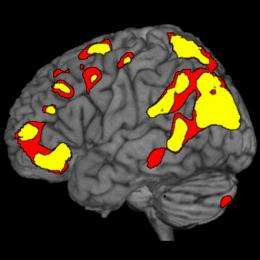December 22, 2010 feature
Scientists find evidence for 'chronesthesia,' or mental time travel

(PhysOrg.com) -- The ability to remember the past and imagine the future can significantly affect a person's decisions in life. Scientists refer to the brain’s ability to think about the past, present, and future as "chronesthesia," or mental time travel, although little is known about which parts of the brain are responsible for these conscious experiences. In a new study, researchers have used functional magnetic resonance imaging (fMRI) to investigate the neural correlates of mental time travel and better understand the nature of the mental time in which the metaphorical "travel" occurs.
The researchers, Lars Nyberg from Umea University in Umea, Sweden; Reza Habib from Southern Illinois University in Carbondale, Illinois; and Alice S. N. Kim, Brian Levine, and Endel Tulving from the University of Toronto in Toronto, Ontario, have published their results in a recent issue of the Proceedings of the National Academy of Sciences.
"Mental time travel consists of two independent sets of processes: (1) those that determine the contents of any act of such ‘travel’: what happens, who are the 'actors,' where does the action occur; it is similar to the contents of watching a movie – everything that you see on the screen; and (2) those that determine the subjective moment of time in which the action takes place – past, present, or future," Tulving told PhysOrg.com.
"In cognitive neuroscience, we know quite a bit (relatively speaking) about perceived, remembered, known, and imagined space," he said. "We know essentially nothing about perceived, remembered, known, and imagined time. When you remember something that you did last night, you are consciously aware not only that the event happened and that you were ‘there,’ as an observer or participant ('episodic memory'), but also that it happened yesterday, that is, at a time that is no more. The question we are asking is, how do you know that it happened at a time other than 'now'?"
In their study, the researchers asked several well-trained subjects to repeatedly think about taking a short walk in a familiar environment in either the imagined past, the real past, the present, or the imagined future. By keeping the content the same and changing only the mental time in which it occurs, the researchers could identify which areas of the brain are correlated with thinking about the same event at different times.
The results showed that certain regions in the left lateral parietal cortex, left frontal cortex, and cerebellum, as well as the thalamus, were activated differently when the subjects thought about the past and future compared with the present. Notably, brain activity was very similar for thinking about all of the non-present times (the imagined past, real past, and imagined future).
Because mental time is a product of the human brain and differs from the external time that is measured by clocks and calendars, scientists also call this time “subjective time.” Chronesthesia, by definition, is a form of consciousness that allows people to think about this subjective time and to mentally travel in it.
Some previous research has questioned whether the concept of subjective time is actually necessary for understanding similarities in brain activity during past and future thinking compared with thinking about the present. A few past studies have suggested that the brain’s ability for scene construction, and not subjective time, can account for the ability to think about past and future events. However, since scene construction was held constant in this study, the new results suggest that the brain’s ability to conceive of a subjective time is in fact necessary to explain how we think about the past and future.
“Until now, the processes that determine contents and the processes that determine time have not been separated in functional neuroimaging studies of chronesthesia; especially, there have been no studies in which brain regions involved in time alone, rather than time together with action, have been identified,” Tulving said. “The concept of ‘chronesthesia’ is essentially brand new. (You find a few entries on it in Google, but not on Web of Science.) Therefore, I would say, the most important result of our study is the novel finding that there seem to exist brain regions that are more active in the (imagined) past and the (imagined) future than they are in the (imagined) present. That is, we found some evidence for chronesthesia. Before we undertook this study it was entirely possible to imagine that we find nothing!”
He added that, at this stage of the game, it is too early to talk about potential implications or applications of understanding how the brain thinks about the past, present, and future.
“Our study, we hope, is the first swallow of the spring, and others will follow,” he said. “Our findings, as I alluded to above, are promising, but they have to be replicated, checked for validity and reliability, and, above all, extended to other conditions and situations, before we can start thinking about their implications and applications (of which it is easy to think of many).”
More information: Lars Nyberg, et al. “Consciousness of subjective time in the brain.” PNAS Early Edition. DOI:10/1073/pnas.1016823108
Copyright 2010 PhysOrg.com.
All rights reserved. This material may not be published, broadcast, rewritten or redistributed in whole or part without the express written permission of PhysOrg.com.













